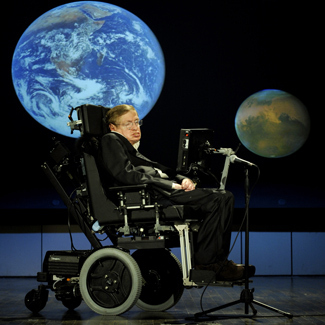Stephen Hawking - A Brilliant Mind That Points to a Brilliant Creator
Stephen Hawking, a world renowned physicist and best-selling author, died early Wednesday in Cambridge England. He is best known for his book, "A Brief History of Time," incidentally a book filled with questions and references about God. He was afflicted with Lou Gehrig's disease, a debilitating neurological disease that progresses and grows worse over time. Yet he overcame this disease and went on to become one of the most famous scientists of our time.
He is known to be an atheist, one who does not believe in the existence of God. But Hawking had denied charges that he was an atheist according to Henry Schaefer, a computational and theoretical chemist. Schaefer stated that when being accused as an atheist, Hawking responded, "I thought I had left the question of the existence of a Supreme Being completely open. . . It would be perfectly consistent with all we know to say that there was a Being who was responsible for all the laws of physics." Schaefer further theorizes that Hawking could have been an agnostic - one who is unsure about God, or a deist - one who believes in God's existence but is detach from His creation.
In one interview with CNN, he quoted, "God may exist, but science can explain the universe without the need for a creator. Notice how he qualified his statement, "God may exist," and not the categorical "God does not exist." Science may give answers to many of the laws that govern nature but science does not explain nor will attempt to explain the meaning of existence, nor the existence of an objective moral values in humans. Paul Davies, an English Physicist, puts it succinctly:
“Science is based on the assumption that the universe is thoroughly rational and logical at all levels. Atheists claim that the laws of nature exist reasonlessly and that the universe is ultimately absurd. As a scientist, I find this hard to accept. There must be an unchanging rational ground in which the logical, orderly nature of the universe is rooted.”
And Gerald Schoeder, an Orthodox Jewish Physicist, asks the one question that matters:
“The most powerful challenge to atheist’s view of the world lies within the world itself: the simple reality of existence. Why is there existence? Forget things as complex as life. Just consider the being of anything: space, time, matter in any form. Is there some law, some axiom, that demands there be existence independent of an underlying force that brought it into being? Even if we posit that the universe and all existence are eternal, the question remains: Why is there an is? It’s a question that call for an answer.”
And this points to the existence of a Divine Rational Being who caused all things to exist. The Psalmist knew this long before there were telescopes, software programs, and computers, "The heavens declare the glory of God; the skies proclaim the work of his hands. Day after day they pour forth speech; night after night they display knowledge. There is no speech or language where their voice is heard" (Psalm 19:1-3).
Stephen Hawking's brilliant, inquisitive mind did not happen by chance nor by random evolutionary process but it can only be attributed to an equally brilliant mind, far superior than anyone, who designed such a complex, rational brain and created a universe full of wonder that provides scientists a full time job to explore.
I'll close with a powerful observation made by Dinesh D' Souza:
"In the secular account, you are the descendant of a tiny cell of primordial protoplasm washed up on an empty beach three and half billion years ago. You are a mere grab bag of atomic particles, a conglomeration of genetic substance. You exist on a tiny planet in a minute solar system in an empty corner of a meaningless universe. You came from nothing and you are going nowhere. In the Christian view you are the special creation of a good and all powerful God. You are the climax of his creation. Your creator loves you so much and so intensely that he desires your companionship and affection that he gave the life of His only son that you might spend eternity with him."

